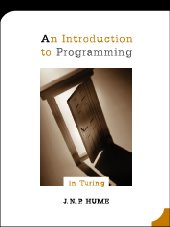Thursday, September 21, 2006
We're studying the Turing programming language because it's simple
The text book we use is An Introduction to Programming in Turing by J.N.P. Hume (Holt Software Associates Inc.).

Students who are a little familiar with programming languages sometimes ask, "Why are we studying Turing? Why aren't we studying Java or C++ or C# or some other language?" There are a couple of good reasons for choosing Turing.
1. TURING IS SIMPLE TO LEARN
Turing is a good programming language to start with because it's one of the simplest languages to learn. For example, here's how to get Turing to show the words Hello, world! on the screen:
put "Hello, world!"
Simple, huh? The keyword put plus quotation marks around what you want to show on the screen. Neat! Now compare how much 'extra stuff' the language C++ needs to do the same thing:

#include
main()
{
cout << "Hello World!";
return 0;
}
Yikes, yuck! Look at that stuff - the #include, the angle brackets, the parentheses, the semi-colons, blah-blah-blah. With Turing you avoid all that.
So by learning Turing, you learn more more in less time with less pain.
2. TURING PREPARES YOU FOR OTHER LANGUAGES
In the coming years, many of you will go on to study Java or C++ or other languages. Is it a waste to start with Turing? No, not at all. Nearly everything you learn in Turing about variables, loops, selection, case statements, graphics, arrays, and so on is easily transferrable when you study another language.

Students who are a little familiar with programming languages sometimes ask, "Why are we studying Turing? Why aren't we studying Java or C++ or C# or some other language?" There are a couple of good reasons for choosing Turing.
1. TURING IS SIMPLE TO LEARN
Turing is a good programming language to start with because it's one of the simplest languages to learn. For example, here's how to get Turing to show the words Hello, world! on the screen:
put "Hello, world!"
Simple, huh? The keyword put plus quotation marks around what you want to show on the screen. Neat! Now compare how much 'extra stuff' the language C++ needs to do the same thing:

#include
main()
{
cout << "Hello World!";
return 0;
}
Yikes, yuck! Look at that stuff - the #include, the angle brackets, the parentheses, the semi-colons, blah-blah-blah. With Turing you avoid all that.
So by learning Turing, you learn more more in less time with less pain.
2. TURING PREPARES YOU FOR OTHER LANGUAGES
In the coming years, many of you will go on to study Java or C++ or other languages. Is it a waste to start with Turing? No, not at all. Nearly everything you learn in Turing about variables, loops, selection, case statements, graphics, arrays, and so on is easily transferrable when you study another language.